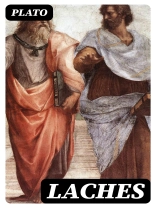In ‘Laches, ‘ Plato presents a profound exploration of virtue and courage through a dialectical dialogue set in the context of Athenian society. The text is characterized by its Socratic method, as dialogues unfold between Socrates, Laches, and Nicias, probing the nature of bravery and its implications for the lives of citizens and soldiers. Through rich philosophical discourse, Plato navigates the complexities of moral absolutism versus relativism, reflecting the intellectual currents of the Classical period, and inviting the reader to consider how philosophical inquiry can illuminate ethical living. Plato, an esteemed philosopher and student of Socrates, composed ‘Laches’ as a means of grappling with the Socratic tradition which emphasizes the importance of defining virtues through rational examination. Having lived through tumultuous periods in Greek history, including the Peloponnesian War, Plato’s reflections on virtue and human behavior resonate with his commitment to uncovering the foundations of ethical living and the responsibilities of citizenship. This compelling dialogue is a must-read for anyone interested in philosophy, ethics, or Athenian political thought. ‘Laches’ challenges readers to engage deeply with concepts of virtue and courage, fostering a critical examination of their own beliefs and the ethical dimensions of their lives.
Об авторе
Plato (circa 427-347 BCE) stands among the towering figures in Western philosophy, whose contributions have profoundly influenced intellectual traditions. Born into an aristocratic Athenian family, Plato was a student of Socrates and became the teacher of Aristotle, forming a classical trio that laid the foundations for Western philosophical thought. Plato’s works are predominantly written in the form of dialogues, where he explores a wide range of topics including justice, beauty, equality, and the nature of reality and existence. A prolific writer, one of his significant yet shorter works, ‘Laches, ‘ delves into the nature of courage. This dialogue presents a nuanced exploration of martial and moral bravery through a conversation between Socrates and two generals, Laches and Nicias. The text is illustrative of Plato’s dialectical method and Socratic irony, which became hallmarks of his literary style. The profound nature of Plato’s dialogues encapsulate his philosophical investigations, leading the reader through rigorous reasoning and questioning. His academy, one of the earliest institutions of higher learning in the Western world, served as a crucible for intellectual development long after his death. Plato’s enduring legacy is embedded in his vision of the ideal state, theory of forms, and the epistemological inquiries that have engaged scholars and students for centuries.












